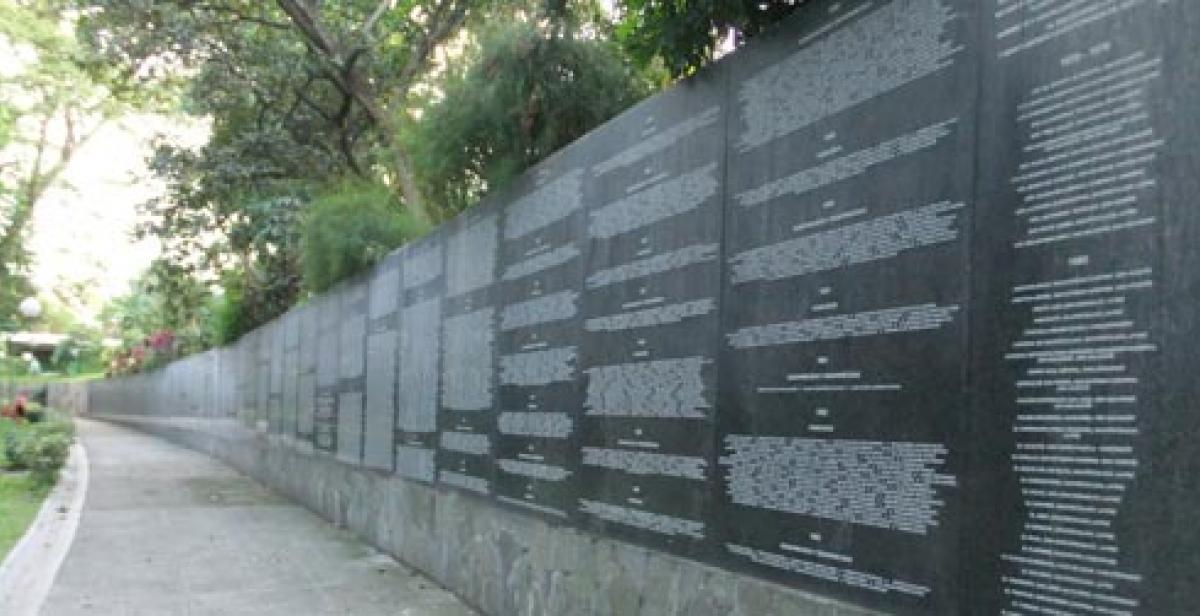By Aasim Shaffi
When I decided to volunteer in El Salvador, a developing country still bleeding from a 12 year long civil war, I wanted to stand with a Salvadoran, take on his problems and see life through his eyes. Despite not being able to do that, I witness the hardship of the people with every day that passes. The civil war left El Salvador 20 years ago, in 1992, but the chill of it still rages on in the civilian population who survived it.
‘We are taught that the right to speak our mind is the right to breathe a free country. However, El Salvador reminds us that freedom is not a given.’
The bravest woman
I would like to introduce you to the bravest woman I have ever met, her name is Madre Guadalupe. In risking her own life in order to fight for the human rights of her people, her actions have been truly selfless. I met her at the ‘Monument to Memory and Truth’, a memorial wall anchored to a city park in the capital of San Salvador.
Guadalupe’s struggles began in the turbulent 1970s, which was the decade leading up to the civil war. The conflict was between the government, headed by the military and the Farabundo Martí National Liberation Front (FMLN). The situation was complex but the shame of the civil war was there for anyone who was willing to look; the government suffocated the country in massacres while the FMLN (a coalition of leftist organisations) claimed to fight for the people. Guadalupe testified to the disregard of human life, stating that the people were denied land to cultivate and their children were left to starve. She and her husband started a union for farmers’ rights but their ‘justice’ was weak and it was met with the brutal fist of the National Guard (an organ of the government at the time).
A hellish world
“The National Guard would come to our house every day and would be aggressive”. As Guadalupe continued, it was clear that aggression preceded death, leaving the children and adults in her community bathed in their own blood. The National Guard specialised in unimaginable torture tactics and the sickening reality that existed in El Salvador spoke of a hellish world, where pregnant women and children were mutilated for ‘the fun of it’. Guadalupe recalled living through that fear, “We could not even sleep in our town homes anymore; we had to flee to the hills to sleep.”
In 1977, Guadalupe’s husband was captured, his limbs were broken, an eye was removed and his body was left decapitated on a mountain. I was amazed at how calm Guadalupe was, as though her pain had lost its voice and I immediately assumed that her tragedy must have ended her efforts against the government. Guadalupe’s community found the body after 7 days and when the judge was called, he brought the National Guard with him. The National Guard asked for family members but Guadalupe denied her husband’s body, so she could live to bring up her children.
Freedom is not a given
The war ended with The Peace Accords, a treaty signed in 1992, which struck an agreement between the opposing sides. With the mediation of the United Nations, major changes took place, including: a cease-fire; demobilization of all FMLN units; reduction in the strength of the Armed Forces to less than 15,000 and the abolishment of the National Guard.

We are taught that the right to speak our mind is the right to breathe in a free country. However, El Salvador reminds us that freedom is not a given. Lupe went to fight and came back a widow. So what would justice mean to you, if it meant risking the lives of your loved ones? These are the dilemmas that Salvadorans were faced with, whilst their lives rested heavily upon their decisions.
Never give up
I was wrong in assuming Guadalupe would give up after her husband’s death, it only proved to motivate her. Although the resolve of the civil war cannot be taken for granted, the sad truth remains etched into the names of the deceased and missing Salvadorans, who pulsate from the black monument wall. Those who committed crimes against humanity are still not held accountable and to this very day the mothers of those victims receive no remorse. Guadalupe continues to see reason to fight for a better country, as she stated “in our country, justice does not work”. It is clear that her journey may be endless and her destination non-existent. However, that does not seem to lower her spirit, “a person always has to have faith, you can never lose faith.”
I would like to conclude with what I have learnt. I could never stand with a Salvadoran and truly comprehend how it feels to live through the civil war but I can learn from him, respect him and better inform my own thinking. Our most basic rights are a privilege and in exercising them, it is easy to be oblivious to the people who gave up their own wellbeing, so we could lead an easier life. In the West, we tend to associate developing countries with sadness but in responding to poverty is strength. Struggling populations around the world need our help but not our pity and in finding themselves in the worst situations such as war, they bring out the greatest asset of humankind, the unbreakable willpower to enforce change for a more honourable world.



